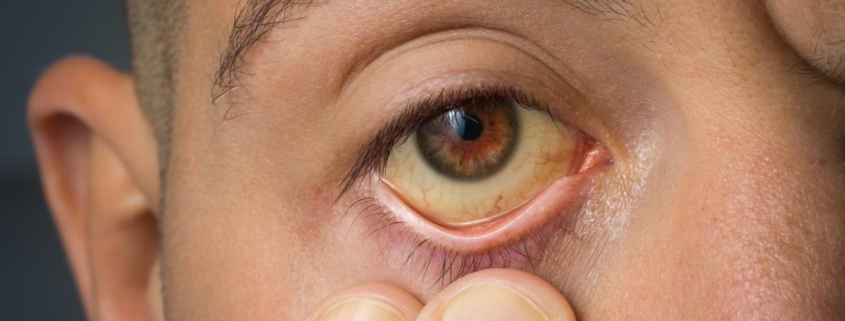Yellow Eyes After Drinking
Table of Contents
Chronic alcohol abuse can cause severe damage to various organs. If you have noticed your eyes taking on a yellow hue, it could be a sign of advanced liver disease. Read on to learn why drinking alcohol can cause yellow eyes.
How Alcohol Abuse Causes Yellow Eyes
Alcohol is a highly toxic substance that can potentially cause serious harm to physical and mental health. Someone with a moderate to severe alcohol use disorder may not be aware of the damage that is taking place. Therefore, when the person suddenly notices their eyes have a yellowish cast, it may be a wake up call.
Yellowing eyes is a telltale sign of a condition called jaundice. Alcoholic jaundice refers to jaundice that is directly associated with alcohol consumption. Jaundice is a sign of liver damage caused by inflammation of the liver, and should be taken very seriously.
How Alcohol Harms the Liver
The liver is the organ that metabolizes alcohol. For someone with a drinking problem, the liver becomes burdened with the task of processing the toxic substance day in and day out. Here are some of the ways that alcohol can harm this important organ:
Fatty Liver. Alcohol abuse causes an accumulation of fat within the liver, which is called hepatic steatosis, or fatty liver. There are seldom any symptoms of this condition, but if it is discovered early enough it can be reversed via sobriety.
Alcoholic Hepatitis. This form of hepatitis, or the swelling and inflammation of the liver, is caused by chronic alcohol abuse. Symptoms include fatigue, nausea, abdominal pain, ascites, and yellow eyes.
Cirrhosis. Late stage alcoholic liver disease is called cirrhosis. Cirrhosis features scarring of the liver that was caused by the liver trying to repair the damage caused by drinking. Over time, the scarring is so severe that the liver cannot function, becoming life threatening. Symptoms include intense fatigue, weight loss, itchy skin, yellow eyes, confusion, swollen legs and feet, nausea, memory loss, and hallucinations.
Are Jaundiced Eyes a Serious Sign?
By the time that yellow eyes result from drinking alcohol are noticed, chances are the person has extensive liver damage. The yellow cast to the eyes is a symptom of the liver being unable to eliminate toxins from the body. This symptom should never be ignored.
If the liver damage is caught prior to the yellowing eyes, such as through routine blood tests, some repair of the liver can happen. This is only possible, though, if the person quits drinking alcohol and makes changes in their diet and lifestyle. Some drugs are available that can help reduce some of the inflammation in the liver. However, if the liver is severely damaged by the time the jaundice is noticeable, then a liver transplant is needed.
What to Do When Your Eyes Have Turned Yellow from Drinking
Once the jaundice becomes evident, the very first step to take is making an appointment with your physician. After the doctor examines the yellowing of the eyes, he or she will order some blood tests and scans to determine the extent of the disease.
Regardless of the extent of the liver damage, the doctor will refer you to an alcohol medical detox and rehabilitation program. There is a sense of urgency about this. Unless you quit drinking alcohol you cannot heal the liver, so a rehab program will provide the tools to succeed.
Alcohol Detox and Withdrawal
When it is time to quit alcohol, it is critical that you approach this step in a safe way. Quitting alcohol cold turkey can be very risky for people with a severe alcohol use disorder. To safely detox from the substance, a medially trained detox team will oversee your detox and withdrawal.
After alcohol cessation, your withdrawal symptoms will begin to surface. Throughout the detox period, your vital signs and withdrawal symptoms will be carefully observed and managed. Medications are provided to reduce discomfort and cravings. The detox team will guide you safely through the process and then transition you into the treatment phase of recovery.
Treatment for Alcohol Use Disorder
The customized treatment plan is based on the specific features of the alcohol use disorder and any co-occurring mental health issues. It will also include medications for healing the liver as prescribed by a physician.
The duration of your stay in treatment depends largely on the severity of the alcohol problem. The more entrenched the alcohol addiction is, the longer the treatment stay. This is because it takes a certain amount of time to reverse alcoholic habits by changing those behaviors.
Treatment for alcohol use disorder involves several therapeutic activities. These include:
- One-on-one talk therapy. A therapist employs evidence-based therapies like CBT and DBT to help you develop new thought and behavior patterns. These techniques help you manage triggers, such as stress or cravings, and avoid relapse.
- Group therapy. You’ll join up with others to discuss recovery topics together. Group sessions can be a vital source of support and bonding while in treatment.
- Classes. Classes include addiction education, relapse prevention, and acquiring recovery skills.
- Holistic activities. You will learn ways to manage stress both in the treatment setting and in recovery. These include yoga, meditation, art therapy, and daily workouts.
- 12-step facilitation. The 12-step program offers a roadmap for the recovery process.
- Non-12 step options. There are other options that can be incorporate if you are not interested in the 12 step model.
How to Sustain Sobriety and Heal the Liver
After completing the treatment program, the challenge of sustaining sobriety lies ahead. To set yourself up for success, it is crucial to continue working your recovery through aftercare actions. These include:
- Outpatient. Stepping down to an outpatient program. This provides ongoing therapy sessions and group support.
- Sober living. Staying in sober living if the home setting is not supportive of your recovery needs.
- A.A. Joining a local A.A. chapter and attending meetings.
- Healthy habits. These include daily exercise, eating a healthy diet, and getting at least seven hours of sleep nightly.
If you have noticed yellow eyes after drinking, do not hesitate to see your doctor. Help is available.
Detox and Treatment for Alcohol Use Disorder
Annandale Behavioral Health is a leading comprehensive residential treatment program. We strive to equip our clients with the skills they’ll need to flourish in recovery. To learn more about our program, please contact us at (855) 778-8668







